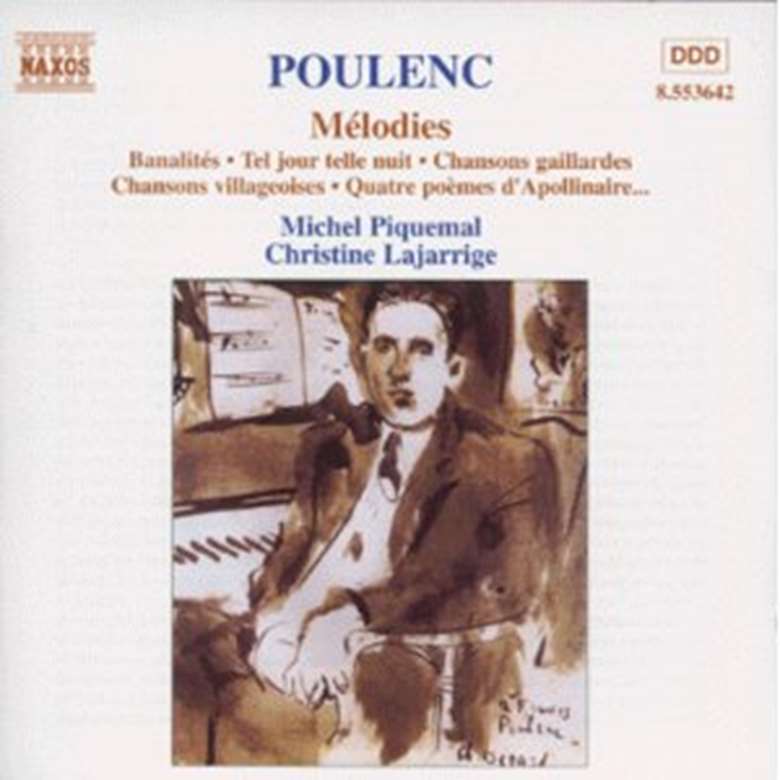Poulenc's Mélodies
Tuesday, November 13, 2012

The Gramophone Choice
Banalités. Bleuet. Chansons gaillardes. Chansons villageoises. Dernier poème. Quatre Poèmes de Guillaume Apollinaire. Métamorphoses – C’est ainsi que tu es. Montparnasse. Poèmes – C. Priez pour paix. Rosemonde. Tel jour, telle nuit – Bonne journée; Une ruine coquille vide; Une herbe pauvre; Je n’ai envie que de t’aimer; Nous avons fait la nuit
Michel Piquemal bar Christine Lajarrige pf
Naxos 8 553642 (67' · DDD · T). Buy from Amazon
The first time Michel Piquemal met Pierre Bernac, for whom most of these songs were written, Piquemal recalls that Bernac said: ‘I am very moved, because what you’re doing is exactly what Francis Poulenc was hoping for. He would have been happy.’ Afterwards Piquemal studied with both Bernac and Denise Duval, the two singers who were closest to the composer, so this recital is part of a real, authentic tradition.
The greatest challenge for a singer comes in the best-known songs, for instance ‘Montparnasse’ and ‘C’. Piquemal doesn’t disappoint. He hasn’t got the luxurious voice for the lyrical climax of the first, at the words ‘Vous êtes en réalité un poète lyrique d’Allemagne / Qui voulez connaître Paris’, but he delivers all the complicated Apollinaire verse in this and the cycle Banalités with a complete understanding of the necessary balance between stressing the irony and maintaining the strict forward-moving musical line.
The one group that wasn’t composed for a light baritone is Chansons villageoises, which, although sung and recorded by Bernac, was intended for a Verdi baritone; ‘Un tour de chant symphonique’ Poulenc called it. Like Bernac, Piquemal doesn’t have the opulent vocal quality here that Poulenc was looking for, but instead he has an actor’s way with the words that brings personality and humour to a text such as the opening ‘Chanson du clair tamis’ – très gai et très vite in Poulenc’s marking. All the brilliance of Maurice Fombeure’s poetry gains clarity from Piquemal’s diction and sense of fun, while the ensuing sadness of ‘C’est le joli printemps’ and the macabre parable of ‘Le mendiant’ are sharply contrasted.
If you want to sample this disc, try ‘Bleuet’, and the ‘sensitive lyricism’ that Bernac wrote of. It’s one of the saddest songs Poulenc composed, with its image of the young soldier, the blue referring to the uniform of the conscript who has seen such terrible things while he’s still almost a child. It has to be sung ‘intimately’, wrote Poulenc; Bernac, however, thought that it should also be ‘virile and serious’. The penultimate line in which the boy faces the reality – he knows death better than life – is sung by Piquemal with a natural feel for the simplicity of the poem, never overdoing the emphasis, and never becoming arch.
At Naxos’s low price this is a first-rate introduction to Poulenc’s songs but, more than that it’s an example of the best kind of French singing. Christine Lajarrige is a sensitive accompanist, for Poulenc always acknowledged that his songs are duets for voice and piano.
Additional Recommendation
‘The Complete Songs, Vol 1’ – A sa guitare. Bleuet. Chansons gaillardes. Cocardes. La courte paille. Dernier poème. Fiançailles pour rire. Métamorphoses. Parisiana. Trois Poèmes de Louise de Vilmorin. Rosemonde. Epitaphe sur un texte de Malherbe
Dame Felicity Lott, Lorna Anderson, Lisa Milne sops Robert Murray ten Christopher Maltman bar Jonathan Lemalu bass-bar Malcolm Martineau pf
Signum SIGCD247 (69’ · DDD · T/t). Buy from Amazon
The distinguished accompanist Malcolm Martineau, with a team of British singers, here sets out on the massive task of recording all the mélodies of Francis Poulenc. All three of the female contributors are first-rate, fresh and bright, attacking cleanly and exploiting a wide tonal and dynamic range.
Broadly speaking, Poulenc’s songs divide themselves into two categories: those which reflect the cabaret tradition with chattering, often syncopated rhythms, and those which subtly skirt sentimentality in haunting, distinctive lyricism. In Métamorphoses, for example, Lisa Milne brings out a delicate sense of fantasy; similarly, in the settings of poems by Louise de Vilmorin, Lorna Anderson uses a beautiful tonal range and, in ‘A sa guitare’, she shades her tone delicately, fresh and bright in echoing the sound of the instrument.
The climax of the disc comes in the seven songs of the sequence entitled La courte paille (‘The Short Straw’). Felicity Lott here exploits her long experience in French operetta in the cabaret-style songs, characterising strongly, while singing with flawless purity up to her highest pianissimo notes in the tenderly lyrical songs. It is good to find this long-favourite singer in such winning voice.
The three male singers in the collection are all good too in the cabaret-style songs, characterising strongly with fine attack. Even so, there are reservations over the lyrical songs, where Christopher Maltman, for example, finds it hard to remain steady in long sustained notes, even though his feeling for words is always most sensitive, and he responds in perfect style to the sequence of 17th-century ribald songs, Chansons gaillardes. Then, in the lovely ‘Rosemonde’, his half-tones are a delight.
Robert Murray is very affecting in another of the most moving of all Poulenc songs, ‘Bleuet’ describing what horrors a young soldier will have seen in the trenches of the First World War (‘You who have seen such terrible things / What do you think of the men of your childhood?’). It is a song which draws on the composer’s homosexual sympathies, just as he shows a natural feeling for the words of the woman poet Louise de Vilmorin, whom he met for the first time in 1934, coaxing a number of poems from her shortly thereafter with a view to setting them to music.
Less successful is the solitary song given to Jonathan Lemalu, where the sustained line of ‘Epitaphe sur un texte de Malherbe’ is not quite steady enough. But generally this generously filled disc makes an impressive start for a project masterminded by Malcolm Martineau.







